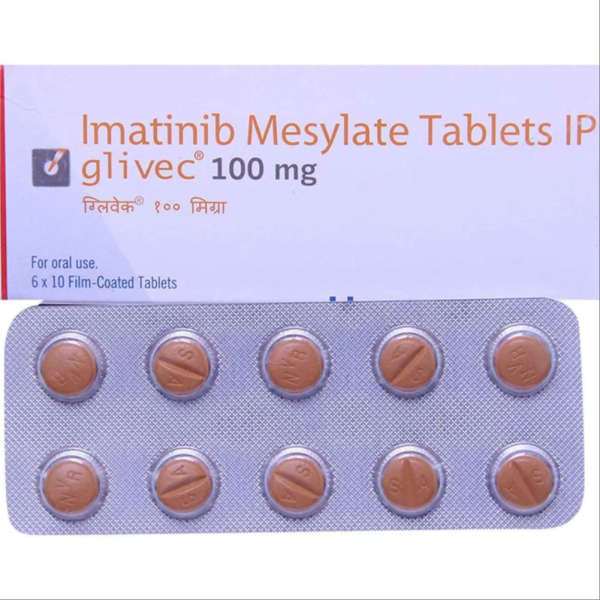Lupinib 100mg Tablet IMATINIB MESYLATE
Introduction to Lupinib 100mg Tablet
The Lupinib 100mg Tablet is a medication primarily used to treat certain types of cancer. It contains the active ingredient Imatinib mesylate, which is effective in managing conditions like chronic myeloid leukemia (CML) and gastrointestinal stromal tumors (GISTs).
Composition of Lupinib 100mg Tablet
The main component of the Lupinib 100mg Tablet is Imatinib mesylate. This ingredient is a type of drug known as a tyrosine kinase inhibitor, which helps in blocking specific proteins that promote cancer cell growth.
Uses of Lupinib 100mg Tablet
- Treatment of chronic myeloid leukemia (CML)
- Management of gastrointestinal stromal tumors (GISTs)
- Effective in treating acute lymphoblastic leukemia (ALL)
- Used for some rare blood and skin cancers
Side effects of Lupinib 100mg Tablet
Common side effects:
- Nausea
- Fatigue
- Diarrhea
- Muscle cramps
- Fluid retention
Serious side effects:
- Liver toxicity
- Heart failure
- Severe bleeding
- Bone marrow suppression
- Lung complications
Precautions of Lupinib 100mg Tablet
Before taking Lupinib, inform your doctor if you have any liver disease, heart failure, or a history of severe allergic reactions. Pregnant women should avoid this medication due to potential harm to the fetus. Use cautiously if you have kidney issues or severe infections.
How to Take Lupinib 100mg Tablet
- Take the tablet as prescribed by your doctor.
- Usually taken once daily, with or without food.
- Swallow the tablet whole with a glass of water.
- Do not crush or chew the tablet.
- Follow your doctor's instructions regarding dosage adjustments.
Conclusion of Lupinib 100mg Tablet
The Lupinib 100mg Tablet is a powerful medication for treating certain types of cancer. While it offers significant benefits, it is essential to be aware of its side effects and take necessary precautions. Always follow your doctor's guidance for the best outcomes.


Can Lupinib tablet be taken safely while breastfeeding?
Lupinib tablet is not recommended while breastfeeding. Limited information is available on whether it passes into human breast milk, but it may pose risks to the infant. Animal studies suggest potential adverse effects on the developing baby. The medication might also affect milk production. If you're taking Lupinib tablet and wish to breastfeed, discuss safer alternatives with your doctor. They can help you choose a treatment that allows you to nurse your baby safely while managing your health condition.

Can Lupinib tablet be taken safely while pregnant?
Lupinib tablet is not recommended during pregnancy due to limited evidence on its safety. Animal studies suggest potential risks to the developing fetus, and there is insufficient data from human observations. Using Lupinib tablet during pregnancy may harm the unborn baby, so it's important to discuss alternative treatments with your doctor. If you're pregnant or planning to become pregnant, talk with your healthcare provider about the safest options for managing your condition. They can help create a treatment plan that protects both you and your baby.

Can I take Lupinib tablet with other prescription drugs?
Lupinib tablet has several important drug interactions. It can interact with medications like warfarin, which is a blood thinner, increasing the risk of bleeding. It may also interact with certain antibiotics and antifungals, affecting how well they work. Some drugs can increase Imatinib levels in your body, leading to more side effects. Always inform your doctor about all medications you're taking to avoid harmful interactions. They can adjust your treatment plan to ensure safety and effectiveness.

Does Lupinib tablet affect appetite?
Lupinib tablet can affect your appetite, sometimes causing a decrease in how much you want to eat. This effect is considered occasional and can range from mild to moderate in severity. If you notice changes in your appetite, talk with your doctor. They can help determine if these changes are related to Lupinib tablet and suggest ways to manage them. Maintaining regular meal times and eating a balanced diet can help manage mild appetite changes while on this medication.

Does Lupinib tablet affect mood?
Lupinib tablet doesn't typically cause mood changes, anxiety, or agitation. Most people take this medication without experiencing mental health effects. If you notice changes in your mood or mental well-being after starting Lupinib tablet, talk with your doctor. These symptoms might be related to something else, like stress or another health condition. Your doctor can help determine what's causing any mental health changes you experience and suggest appropriate support while continuing your treatment.

Does Lupinib tablet affect sleep?
Lupinib tablet doesn't typically cause sleep problems like insomnia or hypersomnia. Most people take this medication without experiencing changes in their sleep patterns. If you notice changes in how well you sleep after starting Lupinib tablet, talk with your doctor. Sleep problems might be related to something else, like another medication or a different health condition. Your doctor can help figure out what's causing your sleep issues and suggest ways to improve your rest while continuing your treatment.

Does Lupinib tablet cause headaches?
Yes, Lupinib tablet can cause headaches in some people. This side effect is considered occasional, meaning it doesn't happen to everyone. The severity of headaches can range from mild to moderate. If you experience mild headaches, staying hydrated and resting may help. Over-the-counter pain relievers can also be used, but check with your doctor first. If headaches become severe or persistent, talk to your healthcare provider. They can help determine if the headaches are related to Lupinib tablet or if there is another cause that needs attention.

Does Lupinib tablet cause stomach upset?
Yes, Lupinib tablet can cause stomach upset, including nausea, vomiting, and diarrhea. These gastrointestinal side effects are considered common, affecting more than 10% of people taking the medication. The severity can range from mild to moderate. To manage mild stomach upset, try taking Lupinib tablet with food and plenty of water. If you experience severe or persistent symptoms, contact your doctor. They can help determine if these symptoms are related to the medication and suggest appropriate treatment options.

Does Lupinib tablet cause weight gain?
Lupinib tablet can affect your weight, often causing weight gain due to fluid retention. This side effect is considered common and can range from mild to moderate in severity. If you notice significant weight changes, talk with your doctor. They can help determine if the weight gain is related to Lupinib tablet and suggest ways to manage it. Monitoring your diet and staying active can also help control weight changes while on this medication. Always follow your doctor's advice for the best results.

Does Lupinib tablet interfere with sexual function?
Yes, Lupinib tablet can interfere with sexual function. Some people may experience erectile dysfunction or a loss of libido, which is a reduced interest in sexual activity. These side effects are considered occasional, meaning they don't happen to everyone. The severity can range from mild to moderate. If you notice changes in your sexual function, talk to your doctor. They can help determine if these changes are related to Lupinib tablet and suggest ways to manage them. It's important to address any concerns you have to maintain your overall well-being while on this medication.

Does Lupinib tablet limit driving?
Lupinib tablet might affect your ability to drive safely in some cases. It can cause dizziness or blurred vision, which may impair driving. If you experience these symptoms, avoid driving until they go away. When you first start taking Lupinib tablet, pay attention to how your body responds before getting behind the wheel. Even if you feel fine initially, continue to monitor yourself for any new symptoms that could affect your driving. Talk with your doctor about any concerns you have about driving while on this medication.

Does Lupinib tablet make it hard to think or concentrate?
Lupinib tablet doesn't typically cause thinking problems or concentration difficulties. Most people take this medication without experiencing changes in mental focus or memory. Cognitive issues like confusion or trouble concentrating aren't common side effects. If you notice problems with your thinking after starting Lupinib tablet, talk with your doctor. These symptoms might be related to something else, such as another health condition. Your doctor can help determine what's causing these issues and suggest solutions while keeping your treatment plan on track.

Does Lupinib tablet make people tired or drowsy?
Yes, Lupinib tablet can cause fatigue or tiredness in some people. This side effect is considered occasional and can range from mild to moderate in severity. If you notice you're feeling unusually tired while taking Lupinib tablet, talk with your doctor. Your tiredness might be caused by something else, like another medication or an underlying health condition. Your doctor can help determine what's causing your symptoms and recommend appropriate adjustments to your treatment plan.

For how long do I take Lupinib tablet?
Lupinib tablet is usually taken long-term for chronic conditions like chronic myeloid leukemia or gastrointestinal stromal tumors. The duration of use depends on your response to treatment and any side effects you experience. Your doctor will guide you on how long to continue taking Lupinib tablet based on your specific health needs. It's important not to stop taking the medication without consulting your doctor, as this could worsen your condition. Always follow your doctor's advice for the best results.

How does Lupinib tablet work?
Lupinib tablet works by inhibiting a protein called tyrosine kinase, which is involved in the growth and spread of cancer cells. Think of it like turning off a switch that allows cancer cells to multiply. By blocking this protein, Lupinib tablet helps slow or stop the growth of cancer cells. This action makes it effective for treating certain types of cancer, such as chronic myeloid leukemia and gastrointestinal stromal tumors. The medication targets cancer cells specifically, helping to minimize damage to healthy cells.

How do I know if Lupinib tablet is working?
You'll know if Lupinib tablet is working by monitoring the condition it's treating, such as chronic myeloid leukemia or gastrointestinal stromal tumors. For leukemia, blood tests will show a decrease in abnormal white blood cells. For tumors, imaging tests may show a reduction in size. Regular check-ups with your doctor are important to assess the medication's effectiveness. They may adjust your treatment based on test results and how you're feeling. Always communicate any changes in symptoms to your healthcare provider.

How do I take Lupinib tablet?
Take Lupinib tablet exactly as your doctor prescribes. It's usually taken once or twice daily, with a meal and a large glass of water to help prevent stomach upset. Do not crush or chew the tablets. If you miss a dose, take it as soon as you remember unless it's almost time for your next dose. In that case, skip the missed dose and continue with your regular schedule. Avoid taking two doses at once. Always follow your doctor's specific instructions regarding food, beverages, and any other medications you may be taking.

How long does it take for Lupinib tablet to start working?
Lupinib tablet starts working in your body shortly after you take it, but the full therapeutic effects may take several weeks to become noticeable. For conditions like chronic myeloid leukemia, blood tests may show improvements within a few weeks. For tumors, it may take longer to see changes in size. How quickly the medication works can depend on your overall health and the specific condition being treated. Always take Lupinib tablet as prescribed and attend regular check-ups to monitor its effectiveness.

How should I store Lupinib tablet?
Store Lupinib tablet at room temperature, away from moisture and light. Keep it in a tightly closed container to protect it from damage. Avoid storing it in humid places like bathrooms, as moisture can affect its effectiveness. If your medication came in packaging that isn't child-resistant, transfer it to a container that children can't easily open. Always keep Lupinib tablet out of reach of children and pets to prevent accidental ingestion. Check the expiration date regularly and dispose of any unused or expired medication properly.

Is Lupinib tablet effective?
Yes, Lupinib tablet is effective for treating certain types of cancer, such as chronic myeloid leukemia and gastrointestinal stromal tumors. It works by inhibiting specific proteins that promote cancer cell growth. Clinical studies have shown significant improvements in health outcomes for patients using Lupinib tablet, including increased survival rates and reduced tumor size. The effectiveness of this medication is well-supported by scientific evidence, making it a valuable treatment option for these conditions. Always follow your doctor's guidance to achieve the best results.

Is Lupinib tablet safe for the elderly?
Elderly patients may be more vulnerable to the side effects of Lupinib tablet, such as fluid retention and heart issues. These risks are due to age-related changes in organ function and the presence of other health conditions. While Lupinib tablet can be used safely in the elderly, careful monitoring is essential. Regular check-ups and communication with your doctor can help manage any potential risks. Your doctor may adjust the dose or provide additional guidance to ensure safe and effective treatment.

Is it safe to drink alcohol while taking Lupinib tablet?
It's best to avoid alcohol while taking Lupinib tablet. Alcohol can increase the risk of liver damage, which is a concern with this medication. Drinking alcohol may also worsen side effects like nausea or dizziness. If you choose to drink occasionally, limit your alcohol intake and watch for warning signs like unusual fatigue or abdominal pain. These symptoms could indicate liver issues and require immediate medical attention. Talk with your doctor about alcohol use while taking Lupinib tablet for personalized advice.

Is it safe to drink coffee or tea while taking Lupinib tablet?
You can drink coffee and tea while taking Lupinib tablet, as there are no known interactions with caffeine. However, both Lupinib tablet and caffeine can cause stomach upset. Drinking too much caffeine might increase this risk. Enjoy caffeinated drinks in moderation and ensure you stay hydrated by drinking plenty of water. If you experience stomach discomfort or other symptoms, talk with your doctor. They can help determine if these symptoms are related to Lupinib tablet or if there might be another cause.

Is it safe to exercise while taking Lupinib tablet?
Yes, you can exercise while taking Lupinib tablet, but be mindful of your body's response. This medication can cause fatigue or muscle cramps, which might affect your exercise capacity. If you feel unusually tired or experience cramps during physical activity, slow down or stop and rest. Stay hydrated and avoid strenuous activities if you notice these symptoms. Most people can maintain their regular exercise routine while on Lupinib tablet, but consult your doctor if you have concerns about your specific situation.

What are Lupinib tablet possible harms and risks?
Common side effects include nausea, fatigue, diarrhea, muscle cramps, and fluid retention (20–50% of patients). Serious risks include liver toxicity, heart failure, and severe bleeding. Rare but severe effects include bone marrow suppression and lung complications.

What disease or symptom is Lupinib tablet used for?
Lupinib tablet is primarily used to treat chronic myeloid leukemia and gastrointestinal stromal tumors. It benefits these conditions by inhibiting specific proteins that promote cancer cell growth. This medication can be used alone or in combination with other therapies to improve treatment outcomes. By targeting cancer cells, Lupinib tablet helps slow or stop their growth, making it an important option for managing these diseases. Always follow your doctor's guidance to ensure the best results from your treatment.

What is Lupinib tablet?
Lupinib tablet is a medication used to treat certain types of cancer, such as chronic myeloid leukemia and gastrointestinal stromal tumors. It belongs to a class of drugs called tyrosine kinase inhibitors, which work by blocking specific proteins that promote cancer cell growth. By inhibiting these proteins, Lupinib tablet helps slow or stop the growth of cancer cells. It's an important treatment option for these conditions and is often used in combination with other therapies to improve outcomes.

What is the usual dose of Lupinib tablet?
The usual starting dose of Lupinib tablet for adults is 400 mg once daily. Your doctor may adjust the dose based on your response and any side effects. The maximum recommended dose is 800 mg per day, usually divided into two doses. For children or elderly patients, dose adjustments may be necessary, and careful monitoring is required. Always follow your doctor's specific dosing instructions for your health needs. Do not change your dose without consulting your healthcare provider.

Who should avoid taking Lupinib tablet?
Lupinib tablet has important contraindications. Do not use it if you're allergic to it or its ingredients, as this can cause severe allergic reactions. It's also contraindicated in patients with severe liver problems, as it can worsen liver function. Caution is needed for those with heart issues or who are pregnant, as the drug may pose risks. Always consult your doctor about your medical history before starting Lupinib tablet. They can help determine if this medication is safe for you and discuss any potential risks.















.svg)
